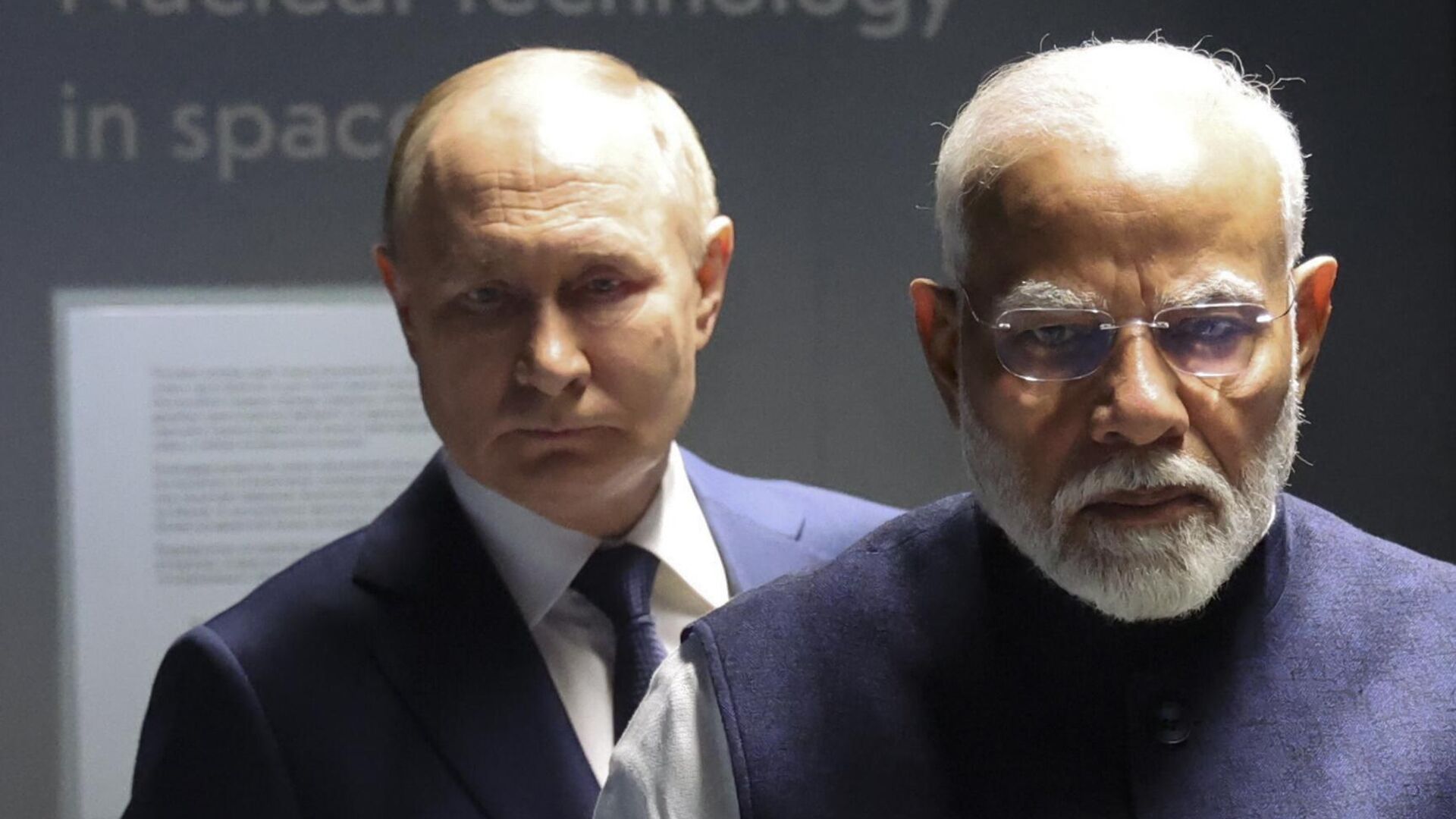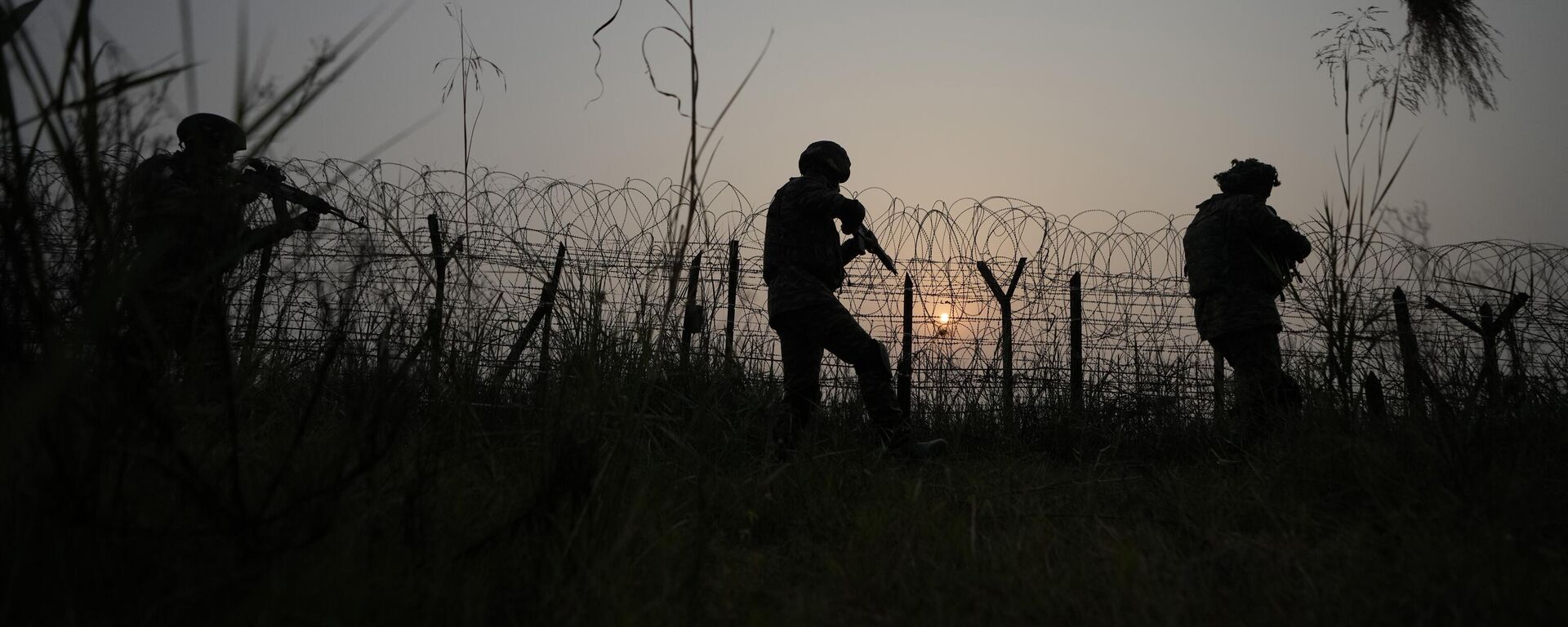https://sputniknews.in/20250430/india-open-to-de-escalation---but-stands-firm-on-accountability-for-terror-9048443.html
India Open to De-escalation - But Stands Firm on Accountability for Terror
India Open to De-escalation - But Stands Firm on Accountability for Terror
Sputnik India
ndia hasn't entirely ruled out the prospect of de-escalation of tensions with Pakistan in the wake of the Pahalgam terrorist attack but remains resolute to pursue accountability.
2025-04-30T19:44+0530
2025-04-30T19:44+0530
2025-04-30T20:46+0530
antonio guterres
donald trump
s. jaishankar
pakistan
russia
the united nations (un)
india
us state department
un security council (unsc)
vladimir putin
https://cdn1.img.sputniknews.in/img/07e9/04/0d/8976497_0:93:1729:1066_1920x0_80_0_0_5cef7392c18bbd10bee825d4316ff11c.jpg
India hasn't entirely ruled out the prospect of de-escalation of tensions with Pakistan in the wake of the Pahalgam terrorist attack but remains resolute to pursue accountability for the deadly incident which left 25 Indians and one Nepalese citizen dead."The Secretary [Marco Rubio] expects to speak with the foreign ministers of Pakistan and India as early as today or tomorrow. He is encouraging other national leaders, other foreign ministers, to also reach out to the countries on this issue," Bruce told a press briefing on Tuesday, adding that it was important for both India and Pakistan to have these conversations.Since the 22 April terror incident, major global powers, BRICS, and the Unite Nations (UN) have condemned the attack. Many of them have backed calls for de-escalation, as India weighs its military options to retaliate against the incident, which it believes was carried out by The Resistance Front (TRF), an offshoot of the UN-designated terrorist group Lashkar-e-Taiba (LeT)*.Prime Minister Narendra Modi chaired a high-level meeting of National Security Advisor Ajit Doval, Defence Minister Rajnath Singh and the tri-services chief at his official residence in New Delhi on Tuesday evening. The Indian PM reportedly gave the Indian forces "operational freedom" to respond to the incident.A Chair's Summary issued on Tuesday at the end of the two-day BRICS Foreign Ministers Meeting in Rio De Janeiro called for accountability, while calling upon the global community to ensure "zero tolerance" for terrorism and rejecting "double standards" on the issue.On Tuesday, UN Secretary-General Antonio Guterres spoke to EAM Jaishankar and Pakistan Prime Minister Shehbaz Sharif, according to a statement from the UN Secretary General's office. While condemning the terrorist attack and backing India's stance on "pursuing accountability and justice", Guterres added that these should be pursued through "lawful means".Jaishankar also spoke to the Foreign Ministers of Somalia, Panama, Slovenia, Guyana, Algeria, Sierra Leone and Greece on Tuesday. In addition to Pakistan, all these countries are currently non-Permanent Members of the UNSC. A UNSC statement condemning the Pahalgam attack on April 25 did not directly name the TRF or LeT, a decision Pakistan’s Deputy Prime Minister and Foreign Minister Ishaq Dar attributed to Pakistan's efforts, as he told the Pakistan Senate.On 26 April, Saudi Arabia's Foreign Minister Faisal Bin Farhad urged both India and Pakistan to "de-escalate tensions" in separate calls with Jaishankar and Dar. Last week, Iranian Foreign Minister Seyed Abbas Aragchi also spoke to his Indian and Pakistani counterparts, telling them that Iran stood ready to use its good offices to "forge greater understanding at this difficult time".China has also called for de-escalation of tensions. In a phone conversation with Dar, Chinese Foreign Minister Wang Yi expressed hope that both India and Pakistan would "exercise restraint and work in the same direction to deescalate the situation", while backing calls for an "impartial investigation". Pakistan PM Sharif has said that his government would back a "neutral, transparent" probe into the incident.Meanwhile, Russian Deputy Foreign Minister Andrey Rudenko held separate meetings with Indian Ambassador Vinay Kumar and Pakistan Ambassador Muhammad Khalid Jamali in Moscow on Monday, according to a Russian Ministry of Foreign Affairs (MFA) readout.At the same time, Rudenko called on both sides to "exercise restraint and engage in constructive dialogue aimed at peacefully resolving their discrepancies," said a Russian MFA readout on the meeting between Rudenko and Pakistani Ambassador.Significantly, Russian President Vladimir Putin, along with US President Donald Trump, was one of the first world leaders to condemn the Pahalgam terror attack. In a strong-worded statement, Putin described the Pahalgam incident as a "brutal crime" having "no justification whatsoever", adding that the perpetrators would face a "deserved punishment".Last week, the Ministry of External Affairs (MEA) also briefed Ambassadors of over 20 countries, including Russia, the US, the EU, China among others, on the Pahalgam terror attack at New Delhi's South Block.Trigunayat noted that although every country has condemned the Pahalgam massacre, a more important issue was to fix culpability based on the origins of terrorists. He expressed hope that Russia would continue to back India in its quest for accountability.No major power, be it Russia or the US, wanted to see a war erupt between India and Pakistan, retired Ambassador KP Fabian, a former Indian envoy to UN organisations, told Sputnik India.*banned terrorist group
https://sputniknews.in/20250430/indian-army-reports-violations-of-ceasefire-by-pakistan-for-6th-night-in-row-9046731.html
pakistan
russia
india
iran
saudi arabia
Sputnik India
feedback.hindi@sputniknews.com
+74956456601
MIA „Rossiya Segodnya“
2025
Dhairya Maheshwari
https://cdn1.img.sputniknews.in/img/07e6/0c/13/138962_0:0:641:640_100x100_80_0_0_2cb44360dbcdf6d84bf4b299cd045917.jpg
Dhairya Maheshwari
https://cdn1.img.sputniknews.in/img/07e6/0c/13/138962_0:0:641:640_100x100_80_0_0_2cb44360dbcdf6d84bf4b299cd045917.jpg
News
en_IN
Sputnik India
feedback.hindi@sputniknews.com
+74956456601
MIA „Rossiya Segodnya“
Sputnik India
feedback.hindi@sputniknews.com
+74956456601
MIA „Rossiya Segodnya“
Dhairya Maheshwari
https://cdn1.img.sputniknews.in/img/07e6/0c/13/138962_0:0:641:640_100x100_80_0_0_2cb44360dbcdf6d84bf4b299cd045917.jpg
india pakistan, india news, india pakistan relations, pahalgam terrorist attack, pahalgam news, pahalgam attack, pahalgam attack update, pahalgam attack news, pahalgam latest, putin on india, putin modi, putin news, trump on modi, trump news, china india, china news
india pakistan, india news, india pakistan relations, pahalgam terrorist attack, pahalgam news, pahalgam attack, pahalgam attack update, pahalgam attack news, pahalgam latest, putin on india, putin modi, putin news, trump on modi, trump news, china india, china news
India Open to De-escalation - But Stands Firm on Accountability for Terror
19:44 30.04.2025 (Updated: 20:46 30.04.2025) EAM Jaishankar has told the UN Secretary-General Antonio Guterres that India is determined to bring the "perpetrators, planners and backers" of the Pahalgam terrorist attack to justice. PM Modi has warned that India would pursue them to the "ends of the earth".
India hasn't entirely ruled out the prospect of de-escalation of tensions with Pakistan in the wake of the Pahalgam terrorist attack but remains resolute to pursue accountability for the deadly incident which left 25 Indians and one Nepalese citizen dead.
A source pointed out to Sputnik India that India hasn't issued any statement rejecting the idea of de-escalation, a day after US State Department spokesperson Tammy Bruce said the Trump administration had been reaching out to both countries, urging them not to escalate the situation.
"The Secretary [Marco Rubio] expects to speak with the foreign ministers of Pakistan and India as early as today or tomorrow. He is encouraging other national leaders, other foreign ministers, to also reach out to the countries on this issue," Bruce told a press briefing on Tuesday, adding that it was important for both India and Pakistan to have these conversations.
Since the 22 April terror incident, major global powers, BRICS, and the Unite Nations (UN) have condemned the attack. Many of them have backed calls for de-escalation, as India weighs its military options to retaliate against the incident, which it believes was carried out by The Resistance Front (TRF), an offshoot of the UN-designated terrorist group Lashkar-e-Taiba (LeT)*.
Prime Minister Narendra Modi chaired a high-level meeting of National Security Advisor Ajit Doval, Defence Minister Rajnath Singh and the tri-services chief at his official residence in New Delhi on Tuesday evening. The Indian PM reportedly gave the Indian forces "operational freedom" to respond to the incident.
A Chair's Summary issued on Tuesday at the end of the two-day BRICS Foreign Ministers Meeting in Rio De Janeiro called for accountability, while calling upon the global community to ensure "zero tolerance" for terrorism and rejecting "double standards" on the issue.
On Tuesday, UN Secretary-General Antonio Guterres spoke to EAM Jaishankar and Pakistan Prime Minister Shehbaz Sharif, according to a statement from the UN Secretary General's office. While condemning the terrorist attack and backing
India's stance on "pursuing accountability and justice", Guterres added that these should be pursued through "lawful means".
Guterres also expressed his "deep concern at
rising tensions" on the Subcontinent, while offering his "Good Offices to support de-escalation efforts".
Jaishankar also spoke to the Foreign Ministers of Somalia, Panama, Slovenia, Guyana, Algeria, Sierra Leone and Greece on Tuesday. In addition to Pakistan, all these countries are currently non-Permanent Members of the UNSC. A UNSC statement condemning the Pahalgam attack on April 25 did not directly name the TRF or LeT, a decision Pakistan’s Deputy Prime Minister and Foreign Minister Ishaq Dar attributed to Pakistan's efforts, as he told the Pakistan Senate.
On 26 April, Saudi Arabia's Foreign Minister Faisal Bin Farhad urged both India and Pakistan to "de-escalate tensions" in separate calls with Jaishankar and Dar. Last week, Iranian Foreign Minister Seyed Abbas Aragchi also spoke to his Indian and Pakistani counterparts, telling them that Iran stood ready to use its good offices to "forge greater understanding at this difficult time".
China has also called for de-escalation of tensions. In a phone conversation with Dar, Chinese Foreign Minister Wang Yi expressed hope that both India and Pakistan would "exercise restraint and work in the same direction to deescalate the situation", while backing calls for an "impartial investigation". Pakistan PM Sharif has said that his government would back a "neutral, transparent" probe into the incident.
Meanwhile, Russian Deputy Foreign Minister Andrey Rudenko held separate meetings with Indian Ambassador Vinay Kumar and Pakistan Ambassador Muhammad Khalid Jamali in Moscow on Monday, according to a Russian Ministry of Foreign Affairs (MFA) readout.
"Russia's readiness to counter the global terrorist threat together with India was reaffirmed," said a statement on the India-Russia meeting.
At the same time, Rudenko called on both sides to "exercise restraint and engage in constructive dialogue aimed at peacefully resolving their discrepancies," said a Russian MFA readout on the meeting between Rudenko and Pakistani Ambassador.
Significantly,
Russian President Vladimir Putin, along with
US President Donald Trump, was one of the first world leaders to condemn the Pahalgam terror attack. In a
strong-worded statement, Putin described the Pahalgam incident as a "brutal crime" having "no justification whatsoever", adding that the perpetrators would face a "deserved punishment".
Last week, the Ministry of External Affairs (MEA) also briefed Ambassadors of over 20 countries, including Russia, the US, the EU, China among others, on the Pahalgam terror attack at New Delhi's South Block.
Commenting on the global mediation efforts underway, former Indian Ambassador Anil Trigunayat told Sputnik India that it was India alone which has suffered decades of cross-border terrorism at the hands of Pakistan-backed groups and entities.
"The US knows its own history of demolishing Afghanistan after the 9/11 terror attacks. We have to take action as we deem appropriate," Trigunayat remarked.
Trigunayat noted that although every country has condemned the Pahalgam massacre, a more important issue was to
fix culpability based on the origins of terrorists. He expressed hope that Russia would continue to back India in its quest for accountability.
No major power, be it Russia or the US, wanted to see a war erupt between India and Pakistan, retired Ambassador KP Fabian, a former Indian envoy to UN organisations, told Sputnik India.
"The best solution is for Pakistan to declare that it will not permit anyone to use its territory to be used for carrying out terrorist attacks against India," Fabian concluded.



